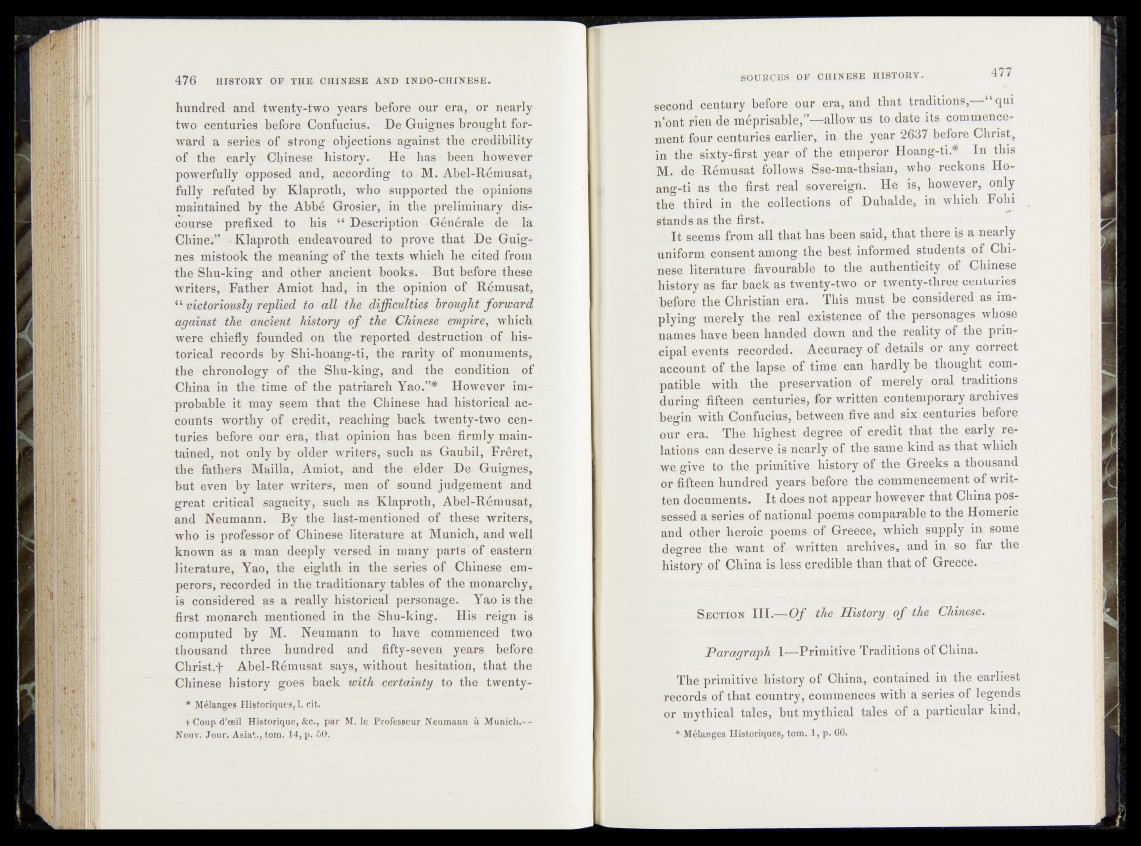
hundred and twenty-two years before our era,, or nearly
two centuries before Confucius. De Guignes brought forward
a series of strong objections against the credibility
of the early Chinese history. He has been however
powerfully opposed and, according" to M. Abel-Rémusat,
fully refuted by Klaproth, who supported the opinions
maintained by the Abbé Grosier, in the preliminary discourse
prefixed to his - Description Générale de la
Chines” -Klaproth endeavoured to prove that J)e Gaig-
nes mistook the meaning of the texts which he cited from
the Shu-king and other ancient books. But before these
writers, Father Amiot had, in the opinion of Remusat,
“ victoriously replied to all the difficulties brought forward
against the ancient history of the Chinese empire, which
were chiefly founded on the reported destruction of historical
records by Shi-hoang-ti, the rarity of monuments,
the chronology of the Shu-king, and the condition of
China in the time of the patriarch Yao.”# However improbable
it may seem that the Chinese had historical accounts
worthy of credit, reaching back twenty-two cem
turies before our era, that opinion has been firmly maintained,
not only by older writers, such as Gauhil, Frêret,
the fathers Mailla, Amiot, and the elder De Guignes,
but even by later writers, men of "sound judgement and
great critical sagacity, such as Klaproth, Abel-Rémusat,
and Neumann. By the last-mentioned of these writers,
who is professor of Chinese literature at Munich, and well
known as a man deeply versed in many parts of eastern
literature, Yao, the eighth in the series of Chinese eva-
perors, recorded in the traditionary tables of the monarchy,
is considered as a really historical personage. Yao is the
first monarch mentioned in the Shu-king. His reign is
computed by M. Neumann to have commenced two
thousand three hundred and fifty-seven years before
Christ;t AbebKemusat says, without hesitation, that the
Chinese history goes back with certainty to the twenty-
* Mélanges Historiques, 1. cit.
t Coup d’eeil Historique, &c., par M. le Professeur Neumann a Munich.—
Nouv. Jour.Asiat., tom. 14, p. 50.
second century before our era, and that traditions,— qui
n’ont rien de mfiprisable,”—'allow us to date its commencem
e n t four contiiries earlier, ip the yeur2fi37; before Christ,
in the sixty-firsViytfiarsof the emperor Hoang-ti* In this
de RemusatifoRowe J3$ermarthsian, who reckons Ho-
ang-ti as the first real sovereign. Be is, however, only
th® third in the collections of Duhalde, in which Fohi
stands as the first-. p • tew»!
It seems from all that has been said, that there is a.-nearly
uniform consent among the hesf infQrmed; students of Chinese
literature favourable to»; the authenticity .of Chinese
history as far back as twentymo or twenty-three centuries
before ‘theaChrigtian era. This must be considered as implying
merely the /real the. personage# jwhose
names have been handed».doaWP'and the reality of the principal
events recorded. Accuracy of details or any correct
account of the lapse of .time can hardly h e thought compatible
with the preservation of « merely oral traditions
during fifteen centuries,„for written contemporary archive#
begin with Confucius, between five and six centuries before
our, era. The highest degree of « # 4 that the early relations
can deserve ismearly of&fhe.same kind as ..that which
we give to the primitive history of the ^Greek# a thousand
or fifteen hundred years before the commencement of written
documents* It does not appear however that China possessed
a series of national poems comparable, to the Homeric
and other heroic poems, ofi Greece, w h i c h s o m e
degree the want of written archives, and in. #o-; far the
history of China is less credible than that of Greece.
S ectio n I I I .—- 0 / the History of the Chinese.
Paragraph 1—Primitive Traditions of China.
The primitive history of China, contained in the earliest
records of that country, commences with a series of legends
or mythical tales, but mythical tales of a particular kind,
* Mélanges Historiques, tom. I, p. 66.